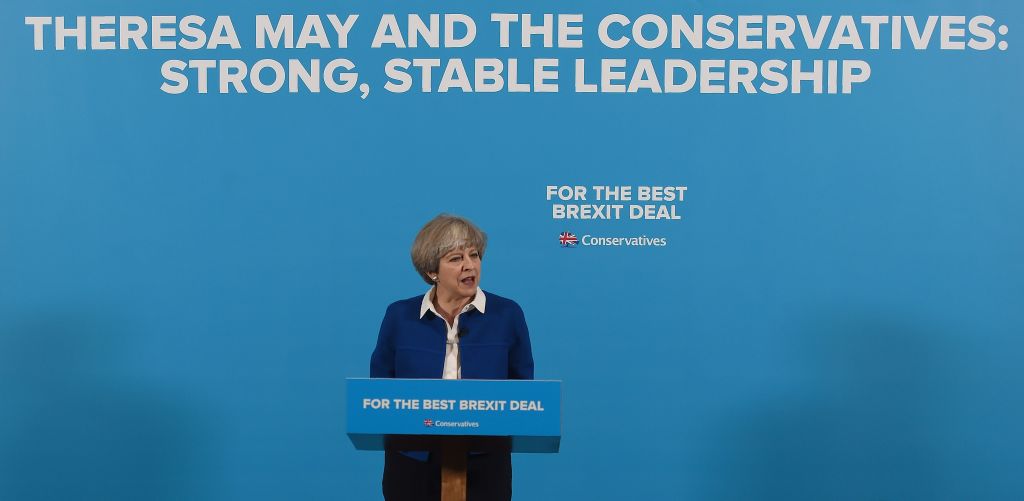Theresa May’s ‘strong and stable’ strapline has apparently been withdrawn after the electorate started to sway with nausea. Yet the words remain emblazoned on the ‘battle bus’, still crop up in interviews, and continue to litter campaign material across the country. To little effect. The phrase was soon found to be a blunt weapon, not cutting through to voters but bludgeoning them into a stupor. To be ‘strong and stable’ is so self-evidently desirable that to say so is vacuous and empty. In fact, as we have seen, this limp phrase has recently rebounded with some force: ‘strong and stable’ has become the benchmark against which to judge a Prime Minister stymied by handbrake U-turns and dithering imprecision.
But Theresa May certainly isn’t the first to use the ‘S’ words. In October 1931, when forced into action by an ‘unnecessary election’, Sir Herbert Samuel conceded that he and his Liberal Ministers ‘felt it their duty to co-operate with the Prime Minister in maintaining a strong and stable Government composed of men of all parties’. The Labour Chancellor, Viscount Snowden, was also on the same page, telling supporters that the two options facing the country were ‘a strong and stable Government in this time of national crisis’ or the option of handing ‘over the destinies of the nation to men whose conduct in a grave emergency has shown them to be unfitted to be trusted with responsibility’. There was no talk of a ‘coalition of chaos’: strength and stability were to be secured by the cross-party nature of National Government. And it worked: such a government held until 1940 (albeit with the Liberal Party splitting in three).
This positive attitude to coalition rule even survived into recent years. In the general election campaign of 2010, the Liberal Democrats warned that the country must embrace coalition or chaos. The Conservative-Lib Dem coalition duly came. And in May 2010, while Clegg and Cameron were still swooning in the Rose Garden, this coalition claimed ‘that strong and stable families of all kinds are the bedrock of a strong and stable society.’ Strength and stability are fickle things, it seems, and a few years later the attacks began against this ‘coalition of chaos’.
Recognising the potency of panic-inducing alliteration, Conservative spads briefed during the election campaign of 2015 that the possible Labour-SNP double-act of Miliband-Salmond could only be a ‘coalition of chaos’. A few turns of the wheel later, and we find ourselves here once more: ‘strong and stable Tories’ versus the rest in oh-so-chaotic coalition.
Everyone’s had a share of ‘strong and stable’. In 1997, Tony Blair pledged to deliver ‘a strong and stable economy’; in 2001, he stressed the importance of ‘strong and stable family life’ to give ‘the best possible start to children’. The Conservatives had already spoken in similar terms. In the 1987 manifesto, for instance, when explaining why the Tories needed an increased majority in parliament (ring any bells?), Margaret Thatcher headed that paragraph with ‘Strong and stable government’.
But is this all just schmaltzy twentieth-century rhetoric? Not at all. 200 years earlier, King George III openly declared his desire for a ‘strong and stable administration’, when the Whig Charles Fox and the Tory Lord North beseeched him in 1784 ‘to lay the foundation of a strong and stable Government’ by ousting the ministry of that upstart, William Pitt the Younger. Elections duly came and went, but Pitt proved to be strongest and stablest of all, serving as prime minister for a total of twenty years.
For a final case, let’s return to the Tories of the twentieth century. In 1924, when Stanley Baldwin sought re-election, he declared to the nation the need for ‘a strong and stable Government’. But this phrase was already ringing hollow. Dismayed at the lack of positive policies, the Spectator was swift to weigh in:
‘Mr. Baldwin’s appeal for a strong and stable Government appears to us to be the voice of a wearied, uncertain and compromising man speaking in muffled tones from the recesses of a sodden haystack’
Make no mistake: words with content cut through the electorate; empty words require the electorate to cut through them, but many find it is easier to shut them out entirely. Yes, ‘strong and stable’ not only deserves to drop off the radar but should never have won pride of place. Baldwin took note, and the panic proved premature: he won a landslide victory, carried aloft by 47 per cent of the electorate. It’s never too late to learn this lesson.






Comments